2020/12/12 A dystopian story of Alex and Charlie
The following is a fictional story based on what I see as a scientist and what I see could happen in the near future looking at the current development. I tried to make it realistic, but feel free to contact me if you disagree.
Alex and Charlie are friends and they both got their master's degrees in physics recently. Alex is truly fascinated by science and also loved his supervisors, but looking at the economic instability of being a scientist, how the PhD students at his group were only talking about the number of papers and impact factors (which he frankly didn't care about) and because of his childhood dream of opening a café, he decides not to become a PhD student. Charlie, on the other hand, is not particularly interested in science, but he heard it's good for his CV and also he is too lazy to look for a job, so he decides to become a PhD student.
Alex opens his café on the outskirts of a big city. After a difficult beginning period, he gets an easygoing life, and he finds some time to look into science again. At first, he uses some conventional simulation tools, but he quickly realizes that he loses most of his time trying to compile different programs, learning each time new syntax for a new program, making sure units and formats are correct etc., which had nothing to do with science. At some point, he discovers a new platform called pyiron, where all this was not necessary, and with his limited knowledge of programming, he realizes that he can truly focus on science. He also recognises that his personal computer is certainly not quite as powerful as what he could get at computer cluster centres, but still there is actually so much that he can achieve with his personal computer. As he moves ahead, instead of publishing results in scientific journals, he publishes them on his website on GitHub and on social media, and instead of going to conferences he uploads his talks on YouTube. He also sees that many of the recent articles are open access, so it's easy for him to learn cutting edge techniques as well.
Charlie, in the meantime, also starts working on his PhD project. His supervisor is a very friendly person and explained him the base theories and the goal, which he understands only partially, but it didn't really matter because there is a lot of programming work to be done ahead of doing science. He shows his results to his supervisor regularly, who is happy to see them and explains Charlie how to interpret them. Charlie is glad to see his supervisor happy, but he doesn't really do more than what's required, since that's just as much as he's interested. He still somewhat likes his topic, but it's definitely not like he would do it without being paid for that. He also reads scientific papers every now and then, either because his supervisor says Charlie should read those ones, or because he needs evidence supporting his results. So he never looks at papers of other topics. Occasionally, he goes to conferences with his supervisor, where he attends talks he barely understands. Also before his talk, he is always too nervous and he anyway cannot listen to any of the talks. After his talk, he gets some questions, some of which are easy, but others are impossible to understand so he always gives a random answer, while he knows in both cases he's not really helping anyone understand anything. Every now and then he publishes papers in famous scientific journals, but every time he gets questions from reviewers, which merely gives him the feeling that the reviewers were just asking those questions only for the sake of asking questions. But all this is not so important to Charlie. He is happy to be the first author of scientific papers published in famous scientific journals, which gives him more and more impact factors. Charlie definitely likes his supervisor, but his supervisor is too busy and hardly available, so that except for the regular meetings, Charlie has practically no one to talk to to ask quick questions.
After some time pursuing his passion, Alex now finds like-minded people in the internet. The reason for them not to be a scientist varied a lot: some of them because of the low income, others because they or their partner got pregnant. There were even those who studied a completely different subject, but followed online courses which gave them the same knowledge, but didn't give them an official degree. In addition, the mass media started to recognise their work - they preferred the easy-to-understand YouTube videos to inaccessible scientific conferences or esoteric scientific papers.
Towards the end of Charlie's PhD, Alex visited him, expecting to strike a great scientific conversation. Alex, deep down, was slightly jealous of Charlie being surrounded by great scientists. To Alex's great surprise, Charlie was not really doing science to Alex's eyes - he's been spending most of his time looking for a new job, correcting details of his new papers and his thesis. He could also only talk about his topic and didn't seem to have knowledge of other areas, even though Alex knows that in Charlie's group there are people working in those areas. As Alex finds out that Charlie was working in a field Alex was also interested in, Alex suggests him to work together. Charlie, in astonishment, tells Alex that it's impossible, because Alex is not a scientist and doesn't have an affiliation. Alex says he could proudly put his café, which Charlie rejects, saying a café cannot be an affiliation, which Alex doesn't understand.
Totally disappointed, Alex goes back home and posts the story on social media. Social media users get very much the same feeling as Alex. In the end they judge that Alex, who didn't become a professional scientist, became a real scientist, while Charlie, who became a professional scientists, didn't become a real one. Two of those who read this story were Skyler and Jay, who are friends and recently got their Master's degree...
Postscript: Both Charlies boss and Charlie are very common people you encounter in science. For now, I don't know how real Alex is, but he is certainly a person that could exist in the near future.
2020/05/01 1+1/2 months of social distancing in Germany
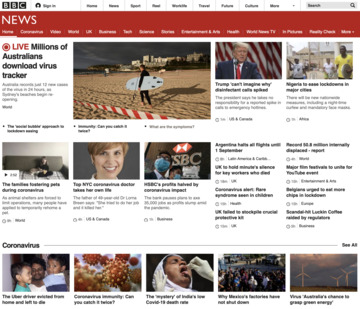 When the first week of effective curfew passed by, I wrote my last article. As there was nearly no transition period, we all directly dived into the quarantine after that. It was difficult to figure out, what kind of mental state we would be, or what kind of life we would be having. As the things drag on, I found out that it was fairly difficult to find it out, partly because people essentially keep telling me they are perfectly fine, even though I never really learn what they were doing. At the same time, the newspapers are getting more and more theoretical, by which I mean it appears to me that they don't really know the authenticity of what they are writing. At least they stopped making scapegoats. That's already an unexpected positive development. I appreciated it, truly.
When the first week of effective curfew passed by, I wrote my last article. As there was nearly no transition period, we all directly dived into the quarantine after that. It was difficult to figure out, what kind of mental state we would be, or what kind of life we would be having. As the things drag on, I found out that it was fairly difficult to find it out, partly because people essentially keep telling me they are perfectly fine, even though I never really learn what they were doing. At the same time, the newspapers are getting more and more theoretical, by which I mean it appears to me that they don't really know the authenticity of what they are writing. At least they stopped making scapegoats. That's already an unexpected positive development. I appreciated it, truly.
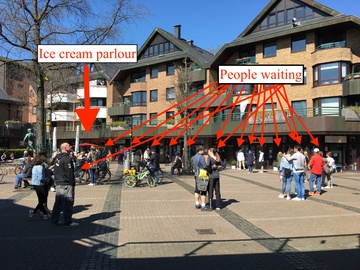 The new reality set in quite quickly. Today, we are not surprised to see that there is no single article unrelated to corona on the homepage of BBC, as you can see on the photo above. Then last week, I cycled along the Rhine again, going through Kaiserswerth. The photo above is what it looked like on the market place of Kaiserswerth. Well, it was a really good weather today, so it's not so surprising that there were people outside, but the amount was extraordinary. Apparently the Germans are not so afraid of the virus (anymore?).
The new reality set in quite quickly. Today, we are not surprised to see that there is no single article unrelated to corona on the homepage of BBC, as you can see on the photo above. Then last week, I cycled along the Rhine again, going through Kaiserswerth. The photo above is what it looked like on the market place of Kaiserswerth. Well, it was a really good weather today, so it's not so surprising that there were people outside, but the amount was extraordinary. Apparently the Germans are not so afraid of the virus (anymore?).
But to be fair, while a whole range of people from medical workers to delivery boys are praised, I must say the greatest praise should go to all the German people, for being extremely efficient and effective about solving the problem. While the nearby countries, such as France of Italy, have laid a real curfew, Germany resisted the move, partly because it has the right capacities for that, but in my opinion the reality was more like when a clear goal such as "cut social contacts" is there, the German government gives a more concise order, and the German people follow the very basic principle of what it means. This is something I still admire here in Germany, especially after I was badly disappointed in France in the aftermath of the terror attacks in 2015, when the politics was much more about exhibitionism than solving real problems. It must have been a horrifying challenge to conduct war against this folk 80 years ago.
However, there's one transition that's really hard to understand: face masks. At the beginning of the pandemic, from Europe to US, all the medical scientists claimed face masks are useless. That could be their scientific conclusion, and science is sometimes also wrong. But they were claiming the telling points at the same time:
- Don't wear a face mask
- Wear a face mask if you are infected.
- You can't know whether you are infected or not (this claim is the basis for the current lockdown)
I'm pretty sure that you don't need a PhD to understand that these three points are not compatible. And as these scientists never resolved this problem, firstly the people started acting (from the beginning I could see a huge increase in the number of people wearing a face mask). Now the governments decided to openly ignore what WHO was claiming and mandatory to wear a mask, while WHO is still following the contradiction. It is just horrible to make the German government ignore what scientists say, because whatever the media talks about, the German government is usually the one that follows science. It was great disappointment that WHO effectively forced them to take a decision not supported by science. And if ever we find out that this huge difference of fatalities between East Asia could be at least partially explained by the face mask, I don't think it's too much to claim that WHO killed poor Italians, Spaniards and much more. Anyway, however effective the masks actually were, for not being able to draw a logical conclusions from the three claims that they were making, I don't consider medicine as science anymore. This in particular means that I might expect them to know something, but I don't expect them to understand anything anymore.
In the meantime, we should rethink of the fact that we were entirely unprepared in many ways when the crisis started, and think of how we could be prepared for the next stage, namely the restrictions are eased. I'm very sure that we are all looking forward to the return of normality, but what we are looking forward to might not necessarily what is waiting for us. This has essentially shown to be true in Japan, the country of natural and human disasters, because recently there was an article about Fukushima, where they looked at the suicide rate around the area affected by the earthquake. They showed that right after the earthquake, when the cities were devastated, the suicide rate went down significantly to go below the national average. A few years later, when the normality came back, the suicide rate overtook the national average. According to this article, it was not only this time that they could observe this phenomenon. This article was particularly striking to me, because indeed when the coronavirus badly hit Germany, everyone was acting cooperatively and exemplarily, as I stated above. What if this is driven by some hope which allows them to look forward to a reality that actually does not exist? This is at least what the cases in Japan show, because if you had asked a rational person after a natural/human catastrophe in Japan, they would have certainly said what they would expect is the return of their normal life. Yet, the statistics shows that the reality failed to meet the expectations. Maybe because we simply always glorify the past? I don't know. Anyway while today we are very much looking forward to a "normal life", we should maybe think about what that actually means and what we are specifically looking forward to.
2020/03/22 Cycling around silent Düsseldorf and airport
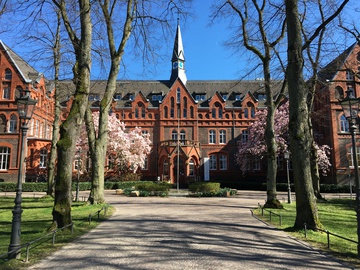 It's been one week since the beginning of an effective curfew. I go jogging essentially everyday and I see that things have changed drastically - it is nearly impossible to see a group of more than 2 people, except for families. What a country of impressively disciplined folk I'm living in.
It's been one week since the beginning of an effective curfew. I go jogging essentially everyday and I see that things have changed drastically - it is nearly impossible to see a group of more than 2 people, except for families. What a country of impressively disciplined folk I'm living in.
In contrast to what I'm seeing here, the media has been spreading hatred relentlessly. Our local newspaper, Rheinische Post, is stridently claiming that curfew is the only one solution. In Bavaria, they introduced a real curfew a few days back, and in agreement with what I'm seeing in Düsseldorf, apparently they couldn't prove infringements since then. This is Germany - 80 years ago, people claimed Jews were destroying Germany, a few years ago it was the Muslims and now the fools. What the media most importantly does is to spread hatred and distrust. "People are stupid" - this is a fixed phrase that you hear quite often here in Germany. What is meant with "people" is usually the ones they have never seen in person, but the fictional ones that they heard about in the media. Well let me tell you one thing: people are doing really super well here. Chill out and relax.
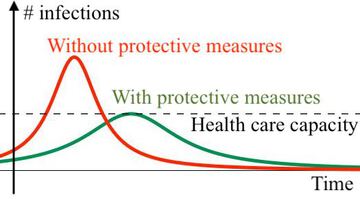 While I see that people are doing what they are supposed to do, I have to say I'm probably one of very few people who still don't understand what the current strategy is. As far as I understand, there is this one thing everyone was talking about - "flatten the curve". What it means is that the total number of infections at the end of the corona outbreak will be essentially the same, which is said to be something like 60 or 70% of the population. Instead of trying to reduce that number, we are trying to reduce the number of acute cases which require treatment in the hospital, so that the health system capacity is not going to be overshot. Here comes my question: If this is the strategy, why are we still seeing the total number of infections in the statistics, which I understand will be the same regardless of the measures we're taking? If we are really going along this strategy, what would make sense to me is (in the order from the least logical to the most logical):
While I see that people are doing what they are supposed to do, I have to say I'm probably one of very few people who still don't understand what the current strategy is. As far as I understand, there is this one thing everyone was talking about - "flatten the curve". What it means is that the total number of infections at the end of the corona outbreak will be essentially the same, which is said to be something like 60 or 70% of the population. Instead of trying to reduce that number, we are trying to reduce the number of acute cases which require treatment in the hospital, so that the health system capacity is not going to be overshot. Here comes my question: If this is the strategy, why are we still seeing the total number of infections in the statistics, which I understand will be the same regardless of the measures we're taking? If we are really going along this strategy, what would make sense to me is (in the order from the least logical to the most logical):
- Number of daily new infections (we see this every now and then, but not consistently)
- Number of daily new acute cases
- Total number of current sick people (i.e. subtract the number of deaths and healed ones from the total number of infections)
- Total number of current acute cases
And after knowing this, we still won't know that would be the reasonable number of current cases, because we don't know how much capacity Germany actually has, which might be difficult to estimate, but giving an order of magnitude would be already quite helpful. In total, what I'd expect the government to announce is something like this: "While we have a health system capacity for XXX people, we already have YYY acute cases and since we are getting ZZZ new cases each day right now, we have to do a curfew". In short, we need the graph above in real time with real numbers. We cannot simply say "there are a lot of cases, so we need a curfew".
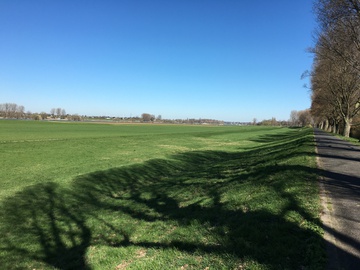 Whether it's going to be a curfew or not, more strict measures are imminent. For this reason, I was thinking about going far from Düsseldorf, like hiking on the Rheinsteig again. But then I changed my mind in the last minute and decided to cycle around this area, to see what it looks like today.
Whether it's going to be a curfew or not, more strict measures are imminent. For this reason, I was thinking about going far from Düsseldorf, like hiking on the Rheinsteig again. But then I changed my mind in the last minute and decided to cycle around this area, to see what it looks like today.
Since last Sunday, we've been having only amazing days. Because of the Corona chaos, we all sort of missed it, but now it's officially spring since yesterday. I first cycled in the city center, just to make sure that it's entirely empty today. Then I continued to the north along the Rhine toward Duisburg. There, I could see some people walking, cycling, jogging etc. As I had expected, I could mostly see families.
I had an ice cream in Kaiserswerth. It's Sunday today. I'd usually have one if we were hiking.
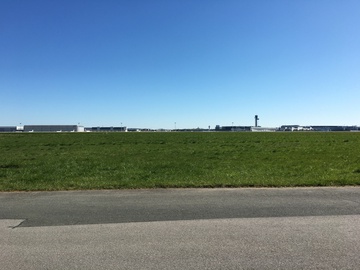 On the way back to Düsseldorf, I realized I was right next to Düsseldorf airport. I decided to take a look at it.
On the way back to Düsseldorf, I realized I was right next to Düsseldorf airport. I decided to take a look at it.
You might already know that Düsseldorf is an important business city. I'm quite sure that it's partially because the airport is quite close to the city center and easy to reach by public transport. So, usually there are flights constantly, like behind one plane you can often see two other planes in the air or more (after all this one of the busiest airports in Europe). Today, I was cycling maybe for half an hour or perhaps longer, but I could hear 2 or 3 planes. This noisy place in the north of Düsseldorf suddenly turned into a void.
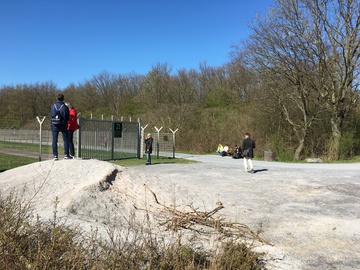 But then, there is this one corner of the airport right above which the planes pass by. Usually, every now and then you could see a few photographers there. Today, maybe out of the fear that they could never see planes again, there were quite a lot of people taking pictures of planes there. I was the one taking a picture of this scene. Maybe there was someone taking a picture of me doing so :).
But then, there is this one corner of the airport right above which the planes pass by. Usually, every now and then you could see a few photographers there. Today, maybe out of the fear that they could never see planes again, there were quite a lot of people taking pictures of planes there. I was the one taking a picture of this scene. Maybe there was someone taking a picture of me doing so :).
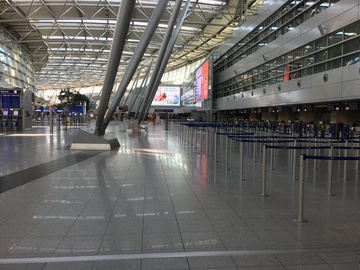 It was not very easy to enter the airport by bike (well, airports are usually not made for bikers...). I didn't have a particular expectation when I entered the building, maybe because it looked perfectly fine from outside.
It was not very easy to enter the airport by bike (well, airports are usually not made for bikers...). I didn't have a particular expectation when I entered the building, maybe because it looked perfectly fine from outside.
It took me a few seconds to grasp the moment of silence. Do you know this feeling of standing in a train where you think it's gonna start moving and you nearly fall down because it actually didn't start moving? It was a little bit like that for my ears. They were expecting this usual tumult of this airport, and they were falling over because it actually wasn't there. The photos you see here are real, but then probably still less real than what I experienced today.
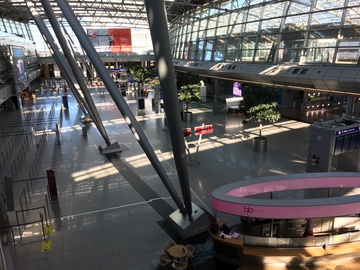 Security staff were chatting. Cleaning ladies were cleaning seats, which were obviously unoccupied for some time. There were some people, obviously working for travel agencies, who probably came to fetch some stuff that they left behind.
Security staff were chatting. Cleaning ladies were cleaning seats, which were obviously unoccupied for some time. There were some people, obviously working for travel agencies, who probably came to fetch some stuff that they left behind.
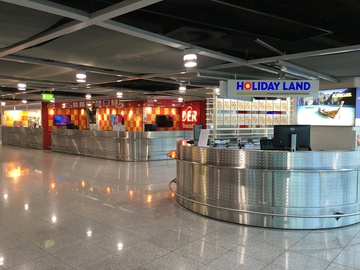 If you know me well, you probably know that I hate flying. There are a lot of things I don't like about flying, and I wished the airports would vanish one day. In this regard, the scenes that I was witnessing today were the ones that I must have been wishing for quite some time. Yet, it was what I didn't want to see now, not this way.
If you know me well, you probably know that I hate flying. There are a lot of things I don't like about flying, and I wished the airports would vanish one day. In this regard, the scenes that I was witnessing today were the ones that I must have been wishing for quite some time. Yet, it was what I didn't want to see now, not this way.
I guess one problem was that everything looked perfectly fine, it's just there was no one. Looking at all the posters ans signs, I could get the feeling that I could talk to the employees and book a flight to wherever, or buy a cheese burger or whatever. It's just, they were not there.
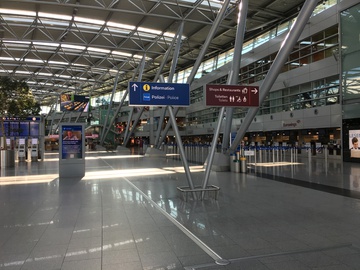 If you know the movie "I am legend", you might understand what kind of situation I was experiencing.
If you know the movie "I am legend", you might understand what kind of situation I was experiencing.
 There was a pharmacy there, the only one place still open. Quite obviously, there was no customer there either. I thought maybe I'm gonna buy a mask, which I have never bought in my entire life. But looking at the success in Japan right now, I got the impression that the masks are actually useful to not transmit virus to other people. I know it won't help me fend off the virus, but I'm not really concerned about that. My hypothesis is that if everyone carries a mask, maybe the virus does not spread anymore.
There was a pharmacy there, the only one place still open. Quite obviously, there was no customer there either. I thought maybe I'm gonna buy a mask, which I have never bought in my entire life. But looking at the success in Japan right now, I got the impression that the masks are actually useful to not transmit virus to other people. I know it won't help me fend off the virus, but I'm not really concerned about that. My hypothesis is that if everyone carries a mask, maybe the virus does not spread anymore.
I thought it was just a piece of rag, but it still cost me 12 € (I bought a bottle of pure alcohol at the same time, to clean my computer screen, not to disinfect my hands). How can this be so expensive?
I left the airport. The sun was still shining outside. The sky was endlessly blue. It's spring, a beautiful season here in Germany.
Whatever the outcome of the current crisis is going to be, the Coronavirus outbreak certainly will have been the incident of the decade, the one that marks the 2020s, just like the financial crisis formed the decade that followed. And certainly, it will have been one of the most important events that shaped the 21st century. In this sense, I daresay we are living a historical moment of mankind. It's been merely a week since the beginning of an effective curfew in Germany. This one week is making history.
Some time in the future, probably years from now, we will look back on this one week and the weeks that follow, and think of what we were doing in this period of time, over and over again. And just as global as the crisis stretched, we will probably wonder what we as a society were doing. In this regard, probably we are about to decide whether we're gonna carry great dignity or hopeless shame to the next generation with us. That's a lot of responsibility compressed in a relatively short period of time.
I know, humans did a lot of things wrong in history, but I'm gonna firmly stick to the idea: Not this time.
2020/03/21 Weekend trip to Offenburg cancelled
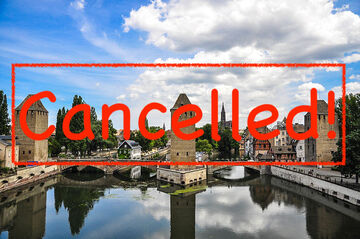 It's hard to believe that it was less than a week ago that we went hiking with little concern. Things changed really quickly. Now I'm sitting in front of my computer, all alone, with no idea when it is going to be the next time that I'm gonna see someone in front of me except for my flatmate.
It's hard to believe that it was less than a week ago that we went hiking with little concern. Things changed really quickly. Now I'm sitting in front of my computer, all alone, with no idea when it is going to be the next time that I'm gonna see someone in front of me except for my flatmate.
In this situation, you are probably not surprised to hear that I had to cancel our weekend trip to Offenburg, which was planned for the Easter weekend, so from April 10 to 13, over 4 days, which certainly would have been amazing. But then, I got a message from the hostel a few days back about the cancellation. Anyway even if had been open, a lot of other things around the hostel would have been closed, like this beautiful city of Strasbourg, as you can see on the photo (photo credit: Wikipedia).
While they cancelled my reservation, they haven't paid me back yet, and it is still not quite clear what's going to happen to the train ticket, since our trains have not been cancelled. Either I pay the cancellation fee or right now the German railway offers a voucher for the exactly the price of the ticket. But actually right now I'm waiting for the German railway to change the train schedule, so that I can get the money back entirely (NB: sometimes they change the train schedule unilaterally, in which case it doesn't matter what kind of ticket you have, you can always cancel the ticket with no fee).
With all this in mind, it is rather unlikely that I'm going to lose money in the end. Even if I do, the maximum damage is manageable. So, already there's nothing you should be worried about.
But then, the story goes actually a bit further, because there's something you don't know yet: From the very first weekend trip I organized, I've been always pooling about 5% of the cost as insurance, so that there is actually money that I can count on. This is done either by setting the price slightly higher in advance (which means for example 21 € instead of 20 €), or getting a voucher from somewhere in the internet.
Setting the success rate to 95% is essentially what most of the insurance companies do. There are two important differences between them and me though: Firstly, in case of insurance companies, they make profit out of it, whereas in my case, it's not what I want. Secondly, they cover only unexpected cancellations, whereas in my case, I have to be liable for all costs, especially like when there were not enough participants for the number of people I make a reservation for. So, I assume that these two points cancel each other out, so that a success rate of 95% is probably not a bad presumption. In this regard, whoever cancels their participation always gets their money back, even though I tell them beforehand it might not be the case, just to make sure that they don't sign up lightheartedly. Luckily, all the events have been successful so far, so that actually the money has been pooled almost excessively.
It is true that it is net loss if small ones are successful and large ones fail, like this time (indeed, the net gain of all trips so far is really super small). But the failure of this time is not inherent to the size of the event, but it's just simply related to the fact that we are facing an unexpected emergency. Therefore, it is totally natural for me to follow the basic principle and pay the money back to everyone. If they prefer, I could also make my book-keeping available (yes, there's a minute book-keeping on my computer), but then my fear is that it becomes very difficult to make sense of the numbers we'd see.
There's another reason that regardless of how much loss I'm going through I'd rather pay everyone back: Whatever the total cost actually is, it is anyway an amount of money that I can manage. The total cost of this trip to Offenburg would have been a few thousand euros. This loss might hurt, but would not change anything in my daily life. On the other hand, by not returning the money, I'd convey the message "you can't trust me". They might not take it personally, but the reality will be the same, especially for the people who struggle with making ends meet. Whether they have understanding for any settlement or not, they wouldn't be able to sign up this way if they cannot be sure. The conclusion is clear to me: the loss of money is manageable, but the loss of trust maybe not.
Anne Frank wrote "I still believe in the goodness of mankind". It's been 75 years since then, and people still say "please participate at your own risk". So weird that my way of thinking is still not the standard in today's society.
2020/03/17 Hiking from Linz to Bad Honnef
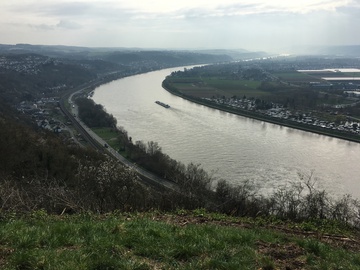 When I created the subdomain for the hiking stuff about a year ago, I was wondering what I'd do with my personal website, namely this page. At least my first intention was not using this page again to leave a hiking report. But then, it happened, as the Coronavirus is ravaging the entire continent here in Europe right now. I cannot possibly write a report on that website, which is supposed to be for public hikes.
When I created the subdomain for the hiking stuff about a year ago, I was wondering what I'd do with my personal website, namely this page. At least my first intention was not using this page again to leave a hiking report. But then, it happened, as the Coronavirus is ravaging the entire continent here in Europe right now. I cannot possibly write a report on that website, which is supposed to be for public hikes.
It was impressive to see the sudden transition in the last few weeks. From the beginning of the Corona outbreak in China, we were constantly getting emails from the administration of the institute, saying we should wash hands, avoid large groups of people etc. All this was conveying the message that the institute would not be shut down. All emails as recent as last Sunday were claiming essentially the same. Then on Monday, we got a message from the administration asking us all to leave the institute. With this, a chaos of emails coming from every direction erupted, starting from how to set up a home office, install an anti-virus software, create a VPN connection, contact right person to talk to and mental health guidance, to explaining all the misunderstandings that might have been caused through these emails and time management and other infrastructures actually not working. We, scientists, had been actually talking about the possibility of this situation for a few weeks anyway, but then because of all those emails coming from the administration claiming that the institute wouldn't be shut down, it appeared to us somewhat inappropriate to talk about this sort of emergency, so that when this emergency arrived, we were thrown into this chaos with no preparation. We saw a similar situation in Fukushima a few years ago, where the government had been claiming for years that the nuclear facilities would never break down, so that no preparation had been organized. There's nothing wrong about being prepared, and that's what we entirely failed to understand this time
With my institute in entire disarray, we are now supposed to work from home, which makes essentially no difference for someone like me, as all I need is a computer and a stable internet connection. Just as before, we have flexible working hours. The only one thing that I'm worried about is that at any moment a state of emergency can be called. Then I might even not be allowed to go outside. So I decided to go for a hike today, with no one with me this time. I took a train from Düsseldorf to Cologne, then to Linz to do a part of what's called Rheinsteig.
While I think everyone agrees going hiking itself is not wrong, it might be questionable to take a train for personal reasons. I don't try to justify my action - there might be health experts who might condemn my action. But from what I understand for now, it is not going to be a question of one or two weeks, but we'll need a sustainable long time solution. For this, instead of saying "Stay home" I'd like to interpret it as "Continue your life but don't meet anyone", which I can probably live with. Of course, I might be contaminated in the public transport, or I might contaminate it. After all, Marcel (my flatmate) came back from South Tirol on Sunday, a high risk area declared by Germany a few days back, and he's been coughing 24/7, so I wouldn't be surprised that he got the virus and maybe me too. I try to stay away from everyone, at least.
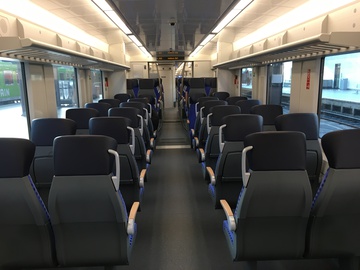 Not quite surprisingly, the trains were near empty. There were a few people though, all of whom taking a significant distance from other passengers, as it appeared to me today.
Not quite surprisingly, the trains were near empty. There were a few people though, all of whom taking a significant distance from other passengers, as it appeared to me today.
There was an important change in the German railway system this year - The federal government decided to reduce the tax on train tickets by more than 10%, so that long-distance trains are much cheaper than before. Besides, there's this thing called Bahncard 50, which is valid for a year and allows you to get every long-distance ticket with 50% discount. This was a significant step for me, since I don't have this almighty monthly ticket in this area, so that I'd usually have to buy an expensive ticket to move around, or find someone who can take me on weekends and in the evening on weekdays. The thing is, quite controversially, now it is cheaper for me to buy a long distance ticket to go to Essen for example, which is actually so cheap that I don't really mind buying it every time. As soon as this tax reduction was introduced, I bought me a Bahncard 50, so that now I can travel everywhere by ICE, the high speed trains in Germany. And so, going from Düsseldorf to the south where I wanted to hike was a comfortable journey for me, although the last part of the trip was with a local train, which is what you see on the photo.
Even though there was nearly no one on the train, the German railway managed to have a significant delay. It's impressive, indeed.
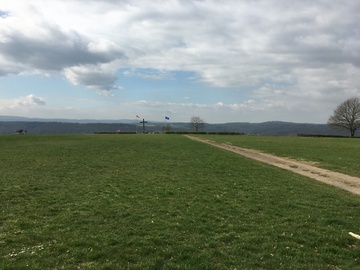 From this small train station, Linz, I directly joined the Rheinsteig. Spring is here. Whether the Corona is sweeping all across Europe or not, we are headed to this beautiful season.
From this small train station, Linz, I directly joined the Rheinsteig. Spring is here. Whether the Corona is sweeping all across Europe or not, we are headed to this beautiful season.
On top of the hill, I could have a great view over the Rhine. It is hard to believe that in this beautiful place, right next to where we are, there's this unknown virus destroying everything silently. The contrast between this peaceful place and the suffering we are going through right now is so strong, that any attempt to connect them appeared entirely irrational to me.
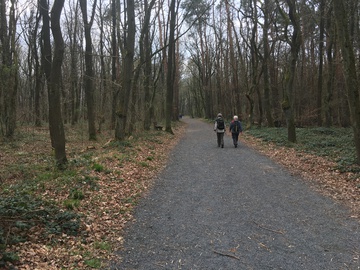 I kept walking. Every now and then, I could see people passing by, most of them at least twice as old as I am. I was wondering, aren't we avoiding social contacts because of you guys? Well, maybe I'm overreacting. After all, they also need some fresh air. We cannot possibly confine them to their homes forever. Or perhaps we're trying to do something we cannot possibly keep doing, namely complete self-isolation. Maybe they are the ones who know what we should be doing in the long run.
I kept walking. Every now and then, I could see people passing by, most of them at least twice as old as I am. I was wondering, aren't we avoiding social contacts because of you guys? Well, maybe I'm overreacting. After all, they also need some fresh air. We cannot possibly confine them to their homes forever. Or perhaps we're trying to do something we cannot possibly keep doing, namely complete self-isolation. Maybe they are the ones who know what we should be doing in the long run.
It was a warm day today. If it had been a holiday and I had organized an event, there would have certainly been a lot of people joining. Today, I was walking all alone, as it's probably going to be the case in the coming weeks.
There was this moment when I was cycling from Europe to Asia, in particular, when I was thinking about the danger of being kidnapped in Iran, arrested by the police in Azerbaijan, cycling in the snowy mountains in Kyrgyzstan, and sleeping alone in the middle of the Gobi desert, that I had to think of how much I had appreciated the life I was living before. Just as much as we can recognize light because there's shadow, I could feel the sense of life because there was death right next to me.
In the coming weeks, we will certainly continue suffering. In the midst of all this, I don't want to look away from the very necessity of what we are doing. Yes, we're fighting the coronavirus, but the consequence of this might be something we have forgotten in this peaceful society. If the daily life before is going to be something we can look forward to, then that's still an achievement that we could appreciate.
I took a train from Bad Honnef back to Düsseldorf. Yes, the future in front us is dreadful. Let's go straight ahead this way.
2020/03/16 I moved to a new host
 I used this host called Just Host, which I started using back in 2012 in order to create a website for my bicycle trip. It was not so bad, but had two drawbacks: firstly, it was extremely slow, and secondly, the subscription was over 4 years. The last extension took place in 2016, which was done automatically and I couldn't really do anything about it. This time, I was also pretty okay to pay the money for the next 4 years, but then I didn't want to continue using the super slow website. At the same time, I was also interested to know how difficult or easy it is to transfer a website to a new host. And now, as the coronavirus ravaged whole Germany and the next hike is probably going to take place some time in far future, I decided to restructure my website, with the hope that it is going to be faster.
I used this host called Just Host, which I started using back in 2012 in order to create a website for my bicycle trip. It was not so bad, but had two drawbacks: firstly, it was extremely slow, and secondly, the subscription was over 4 years. The last extension took place in 2016, which was done automatically and I couldn't really do anything about it. This time, I was also pretty okay to pay the money for the next 4 years, but then I didn't want to continue using the super slow website. At the same time, I was also interested to know how difficult or easy it is to transfer a website to a new host. And now, as the coronavirus ravaged whole Germany and the next hike is probably going to take place some time in far future, I decided to restructure my website, with the hope that it is going to be faster.
Denis, who's specialized in this area recommended Hetzner, which I had never heard of. But then it looked like a decent one and I decided to use it. As it turned out, it was super easy to transfer the domain. And here we are, you are reading this text on the new host. Did you notice that it's got much faster than a few weeks ago?
Anyway, I'm glad that I managed to do what I always wanted to do in the last 8 years. Besides I have the feeling that I did something meaningful during this near lock down in Germany. I'll try to update my website more often, so please look forward to it :)
Oh before I forget: I wrote a new php function which creates an image dynamically with a logo of my website here, which means if I ever change my domain, I can put another URL and it'll work perfectly fine. Amazing, isn't it? So click on the photo above, which shows what it is like right now in Düsseldorf, and see how it works!
2020/02/02 The broken dream of Couchsurfing and my personal farewell to them.
It was sometime in 2010. I was planning a trip to Japan with my then girlfriend, when I came across this thing called Couchsurfing. I was a very different person at that time. I could not possibly think of staying at an unknown person's place. But then, with the small amount of money that I availed at that time, I simply decided to give it a try, only to be stunned by the great idea that enchanted me over the 10 years.
It is certainly not just my personal problem that it was hard to imagine at someone's place. It is indeed clear that the community is created by those people, who can be fascinated by this kind of idea. To be fair, the people were not always perfect, but we all shared same kind of values. This allowed me to be sure that whichever events I join, I wouldn't have to be worried about entering an entirely wrong environment. It allowed me to cycle solo from France to Japan. I met my former flatmate, Adrián, there, who'd change my life entirely in the two years and half that we lived together. My 20s was absolutely formed through encounters on Couchsurfing. Hard to imagine what a kind of person I'd be today without it.
But then, just as many things these days, the success was apparently not quite sustainable. It turned to a for-profit company sometime in the beginning of 2010s, which started causing havoc in the community. There are companies, which are by their nature profitable, like Airbnb or Uber. Couchsurfing isn't. It is undeniably difficult to collect money from the Couchsurfing users, since many of them used the platform because they didn't have money. You could maybe also put external advertisements on the website, which they apparently didn't want to do (they did it for some time, but then it disappeared at some point). One way or other, the platform started to fall apart faster than the users started taking distance. The site was full of glitches. The admins were not properly responding to community problems. And still they kept making it harder for everyone to use the site without paying money.
The decisive day came this week for me. In my weekly hiking event, which has been taking place over 3 years with more than 1,000 people who have joined so far, which is also pretty much the only one very active event in this region with the highest population density of all Europe, I tried to send a message to everyone with a link to the WhatsApp group. Then they blocked my account systematically, because the system detected the WhatsApp link. It didn't matter what the content was. It was enough to have this one link and it got blocked. After my account got blocked on Saturday, I had to wait until Sunday to get it restored. As the event took place on Sunday, the damage was done, nevertheless.
The number of amazing people I met over Couchsurfing in the last 3 years is mind boggling. It is still a fascinating community of great people that I could hardly leave. But whatever the people are like, this platform is dead. We were all anyway expecting this to happen at some point. Whether I leave it or not will not change the course of its destiny.
But then, I realized that since the beginning of 2017, I was very much the person keeping this platform afloat. After I stopped organizing hikes, there was essentially nothing remaining anymore in Düsseldorf. There's this one Friday meetup, but just like every other weekend meetup, this one has become more like a place for those who still don't know what to do on Friday evening.
Good luck Couchsurfing. I'm not coming back. Thank you for all the beautiful memories and great experiences that you used to offer, but you can't anymore.

















